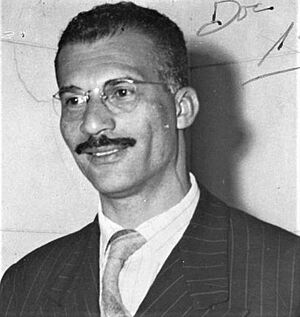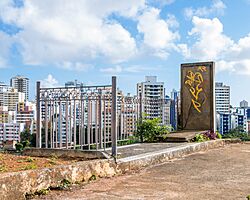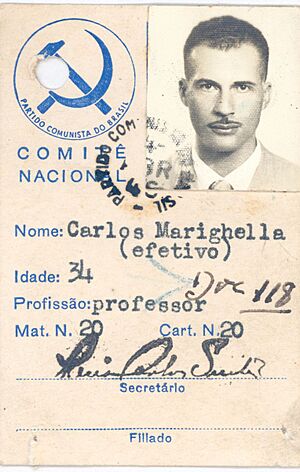Carlos Marighella facts for kids
Quick facts for kids
Carlos Marighella
|
|
|---|---|
 |
|
| Member of the Chamber of Deputies | |
| In office 5 February 1946 – 10 January 1948 |
|
| Constituency | Bahia |
| Personal details | |
| Born | 5 December 1911 Salvador, Bahia, Brazil |
| Died | 4 November 1969 (aged 57) São Paulo, Brazil |
| Cause of death | Assassination |
| Resting place | Cemitério Público da Quinta dos Lázaros, Salvador, Bahia |
| Political party | PCB (1932–1964) |
| Spouse |
Clara Charf
(m. 1948) |
| Domestic partners | Elza Sento Sé Zilda Xavier Pereira |
| Children | Carlos Augusto |
| Parents |
|
| Occupation | Politician, guerrilla fighter, poetist, professor |
| Organization | ALN (1964–1969) |
Carlos Marighella (5 December 1911 – 4 November 1969) was a Brazilian politician, writer, and activist. He believed in a political idea called Marxism–Leninism, which aims for a society where everyone is equal. Marighella disagreed with peaceful ways to oppose the Brazilian military dictatorship. He started a group called Ação Libertadora Nacional (ALN). This group used different methods to challenge the military government. Marighella was killed by police in 1969 during an ambush. His most famous writing was the Minimanual of the Urban Guerrilla.
Contents
Early Life and Political Start
Carlos Marighella was born in Salvador, Bahia. His father, Augusto Marighella, was an Italian immigrant and a blue-collar worker (someone who works with their hands). His mother, Maria Rita do Nascimento, was an Afro-Brazilian woman. Her family came from the Sudan region of Africa.
Carlos grew up in Salvador. He went to primary and secondary school there. In 1934, he left engineering school. He wanted to become an active member of the Brazilian Communist Party (PCB). He then moved to Rio de Janeiro to help rebuild the PCB.
Carlos was raised in a Catholic home. His father was Catholic, and his mother had an African Muslim background. In his early 20s, Carlos became an atheist.
Arrests and Activism
Marighella was first arrested in 1932. This happened after he wrote a poem that criticized the government of Bahia. On May 1, 1936, he was arrested again for "subversion." This means he was accused of trying to overthrow the government. He was held in jail for a year.
He was released but soon went "clandestine." This means he worked secretly, as his party was banned. He was caught again in 1939. He stayed in jail until 1945. At that time, a new law freed many political prisoners.
The next year, Marighella was elected as a federal deputy for Bahia. But he lost his position in 1948. This happened when the PCB party was banned again. He went back to working secretly. He held many important roles in the party leadership.
Between 1953 and 1954, Marighella visited China. He was invited by the Chinese Communist Party. He wanted to learn about their revolution. In May 1964, after a military coup, he was shot and arrested. This happened at a movie theater in Rio. He was released the next year by a court order.
Writing and New Group
In 1966, Marighella wrote a book called The Brazilian Crisis. In it, he supported using armed struggle against the military dictatorship. Later that year, he left his leadership role in the PCB.
In August 1967, he went to a conference in Havana. This was against his party's wishes. In Havana, he wrote Some Questions About the Guerrillas in Brazil. This writing was dedicated to Che Guevara. It was published in a newspaper in 1968. That same year, he was removed from the PCB. In February 1968, he started a new group. It was called the Ação Libertadora Nacional (ALN).
Ação Libertadora Nacional (ALN)
The police linked the ALN to the death of Charles Rodney Chandler. This was reported in the newspaper at the time.
In September 1969, ALN members worked with another group. They took the U.S. ambassador, Charles Burke Elbrick. This was a coordinated action.
Death

After various actions by his group, the police wanted to stop him. He was shot by police in an ambush. This happened on November 4, 1969, in São Paulo. A police deputy named Sérgio Paranhos Fleury organized this ambush.
Marighella was buried in Salvador, Bahia. His tombstone was designed by the famous architect Oscar Niemeyer. It is the only grave monument Niemeyer ever designed. The tombstone has a quote from Marighella: "I didn't have time to be afraid."
Legacy
Marighella's most famous work is the Minimanual of the Urban Guerrilla. This book gives advice on how to challenge and overthrow a military government. It was written shortly before his death in 1969. The Minimanual was first published in English in 1970.
 | John T. Biggers |
 | Thomas Blackshear |
 | Mark Bradford |
 | Beverly Buchanan |


